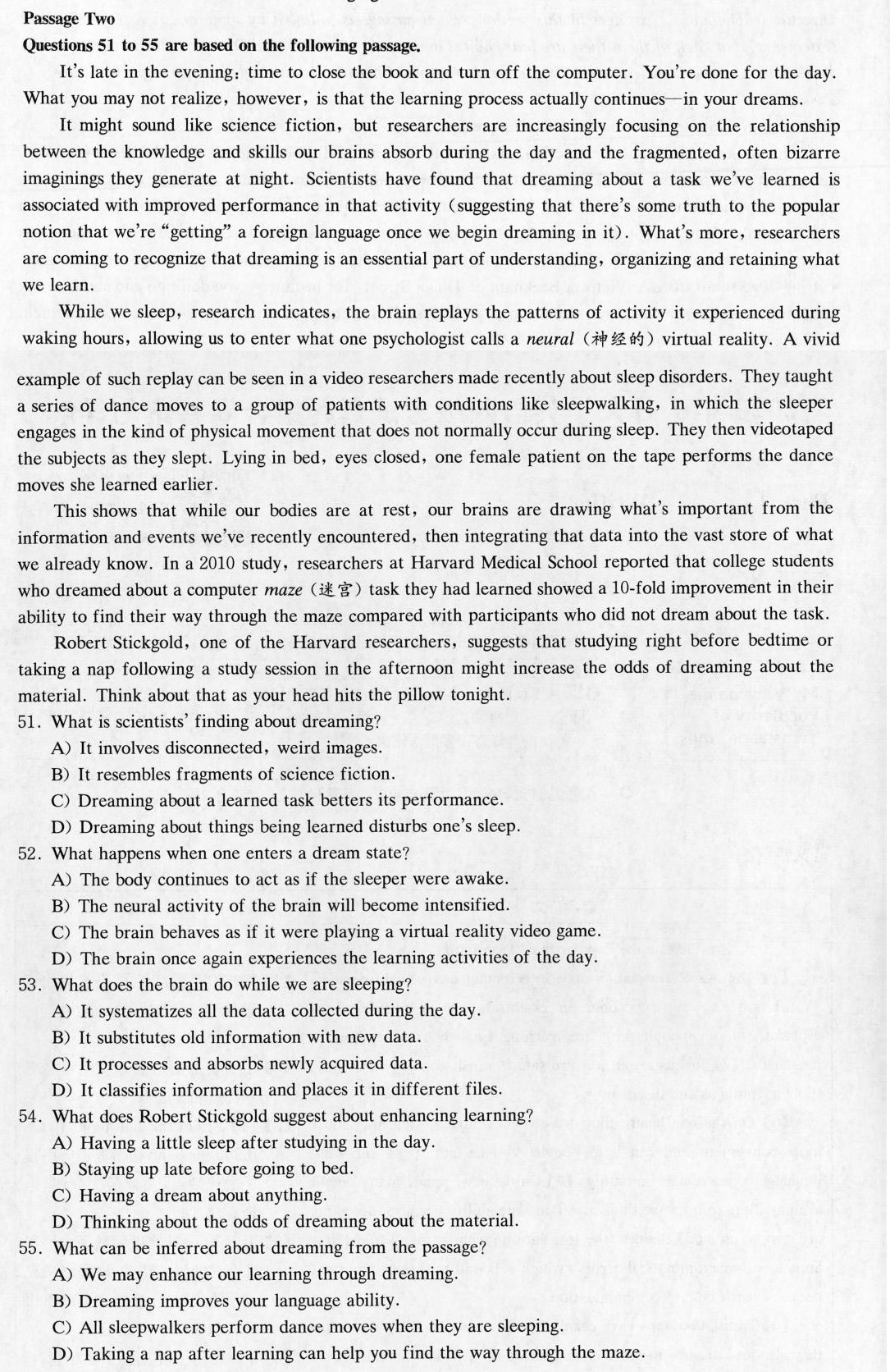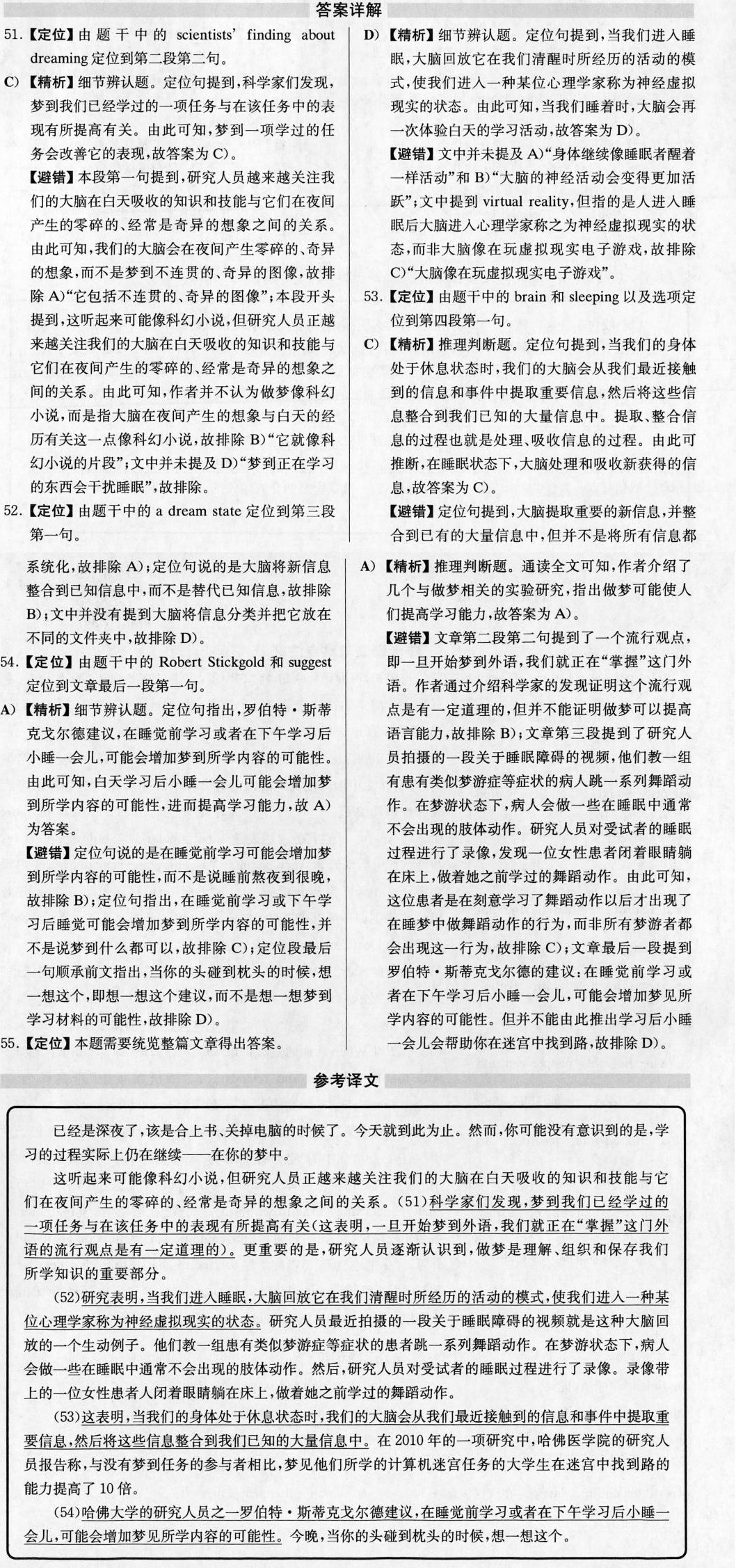Passage Two-|||-Questions 51 to 55 are based on the following passage-|||-It`s late in the evening:time to close the book and turn off the computer.You`re done for the day.-|||-What you may not realize,however,is that the learning process actually continues-in your dreams.-|||-It might sound like science fiction,but researchers are increasingly focusing on the relationship-|||-between the knowledge and skills our brains absorb during the day and the fragmented,often bizarre-|||-imaginings they generate at night. Scientists have found that dreaming about a task we`ve learned is-|||-associated with improved performance in that activity (suggesting that there`s some truth to the popular-|||-notion that we`re getting"a foreign languag once we begin dreaming in it).What`s more,researchers-|||-are coming to recognize that dreaming is an essential part of understanding,organizing and retaining what-|||-we learn.-|||-While we sleep,research indicates,the brain replays the patterns of activity it experienced during-|||-waking hours,allowing us to enter what one psychologist calls a neural(神经的)virtua reality.A vivid-|||-example of such replay can be seen in a video researchers made recently about sleep disorders.They taught-|||-series of dance moves to a group of patients with conditions like sleepwalking,in which the sleeper-|||-engages in the kind of physical movement that does not normally occur during sleep. They then videotaped-|||-the subjects as they slept. Lying in bed,eyes closed,one female patient on the tape performs the dance-|||-moves she learned earlier.-|||-This shows that while our bodies are at rest,our brains are drawing what`s important from the-|||-information and events we`ve recently encountere then integrating that data into the vast store of what-|||-we already know.In a 2010 study,researchers at Harvard Medical School reported that college students-|||-who dreamed about a computer maze(迷宫)task they had learned showed a 10-fold improvement in their-|||-ability to find their way through the maze compared with participants who did not dream about the task.-|||-Robert Stickgold,one of the Harvard researchers,suggests that studying right before bedtime or-|||-taking a nap following a study session in the afternoon might increase the odds of dreaming about the-|||-material.Think about that as your head hits the pillow tonight.-|||-51.What is scientists`finding about dreaming?-|||-A)It involves disconnecte weird images.-|||-B)It resembles fragments of science fiction.-|||-C)Dreaming about a learned task betters its performance.-|||-D)Dreaming about things being learned disturbs one`s sleep.-|||-52.What happens when one enters a dream state?-|||-A)The body continues to act as if the sleeper were awake-|||-B)The neural activity of the brain will become intensified.-|||-C)The brain behaves as if it were playing a virtual reality video game.-|||-D)The brain once again experiences the learning activities of the day.-|||-53.What does the brain do while we are sleeping?-|||-A)It systematizes all the data collected during the day.-|||-B)It substitutes old information with new data.-|||-C)It processes and absorbs newly acquired data.-|||-D)It classifies information and places it in different files.-|||-54.What does Robert Stickgold suggest about enhancing learning?-|||-A)Having a little sleep after studying in the day.-|||-B)Staying up late before going to bed.-|||-C)Having a dream about anything.-|||-D) Thinking about the odds of dreaming about the material.-|||-55.What can be inferred about dreaming from the passage?-|||-A)We may enhance our learning through dreaming.-|||-B)Dreaming improves your language ability.-|||-C)All sleepwalkers perform dance moves when they are sleeping.-|||-D)Taking a nap after learning can help you find the way through the maze.Passage Two Questions 51 to 55 are based on the following passage, It's late in the evening:time to close the book and turn off the computer.You're done for the day. What you may not realize,however,is that the learning process actually continues-in your dreams. It might sound like science fiction, but researchers are increasingly focusing on the relationship between the knowledge and skills our brains absorb during the day and the fragmented, often bizarre imaginings they generate at night. Scientists have found that dreaming about a task we've learned is associated with improved performance in that activity (suggesting that there's some truth to the popular notion that we're"getting"a foreign language once we begin dreaming in it). What's more,researchers are coming to recognize that dreaming is an essential part of understanding,organizing and retaining what we learn. While we sleep,research indicates,the brain replays the patterns of activity it experienced during waking hours, allowing us to enter what one psychologist calls a neural(神经的)virtual reality. A vivid example of such replay can be seen in a video researchers made recently about sleep disorders. They taught a series of dance moves to a group of patients with conditions like sleepwalking,in which the sleeper engages in the kind of physical movement that does not normally occur during sleep. They then videotaped the subjects as they slept. Lying in bed, eyes closed,one female patient on the tape performs the dance moves she learned earlier. This shows that while our bodies are at rest,our brains are drawing what's important from the information and events we've recently encountered.Then integrating that data into the vast store of what we already know.In a 2010 study, researchers at Harvard Medical School reported that college students who dreamed about a computer maze(迷宫)task they had learned showed a 10-fold improvement in their ability to find their way through the maze compared with participants who did not dream about the task. Robert Stickgold, one of the Harvard researchers,suggests that studying right before bedtime or taking a nap following a study session in the afternoon might increase the odds of dreaming about the material. Think about that as your head hits the pillow tonight. 51.What is scientists' finding about dreaming? A) It involves disconnected, weird images. B)It resembles fragments of science fiction. C)Dreaming about a learned task betters its performance. D) Dreaming about things being learned disturbs one's sleep. 52.What happens when one enters a dream state? A) The body continues to act as if the sleeper were awake. B)The neural activity of the brain will become intensified. C)The brain behaves as if it were playing a virtual reality video game. D) The brain once again experiences the learning activities of the day. 53.What does the brain do while we are sleeping? A) It systematizes all the data collected during the day. B)It substitutes old information with new data. C) It processes and absorbs newly acquired data. D)It classifies information and places it in different files. 54.What does Robert Stickgold suggest about enhancing learning? A) Having a little sleep after studying in the day. B) Staying up late before going to bed. C) Having a dream about anything. D)Thinking about the odds of dreaming about the material. 55.What can be inferred about dreaming from the passage? A)We may enhance our learning through dreaming. B) Dreaming improves your language ability. C) All sleepwalkers perform dance moves when they are sleeping. D) Taking a nap after learning can help you find the way through the maze.

Passage Two Questions 51 to 55 are based on the following passage, It's late in the evening:time to close the book and turn off the computer.You're done for the day. What you may not realize,however,is that the learning process actually continues-in your dreams. It might sound like science fiction, but researchers are increasingly focusing on the relationship between the knowledge and skills our brains absorb during the day and the fragmented, often bizarre imaginings they generate at night. Scientists have found that dreaming about a task we've learned is associated with improved performance in that activity (suggesting that there's some truth to the popular notion that we're"getting"a foreign language once we begin dreaming in it). What's more,researchers are coming to recognize that dreaming is an essential part of understanding,organizing and retaining what we learn. While we sleep,research indicates,the brain replays the patterns of activity it experienced during waking hours, allowing us to enter what one psychologist calls a neural(神经的)virtual reality. A vivid example of such replay can be seen in a video researchers made recently about sleep disorders. They taught a series of dance moves to a group of patients with conditions like sleepwalking,in which the sleeper engages in the kind of physical movement that does not normally occur during sleep. They then videotaped the subjects as they slept. Lying in bed, eyes closed,one female patient on the tape performs the dance moves she learned earlier. This shows that while our bodies are at rest,our brains are drawing what's important from the information and events we've recently encountered.Then integrating that data into the vast store of what we already know.In a 2010 study, researchers at Harvard Medical School reported that college students who dreamed about a computer maze(迷宫)task they had learned showed a 10-fold improvement in their ability to find their way through the maze compared with participants who did not dream about the task. Robert Stickgold, one of the Harvard researchers,suggests that studying right before bedtime or taking a nap following a study session in the afternoon might increase the odds of dreaming about the material. Think about that as your head hits the pillow tonight. 51.What is scientists' finding about dreaming? A) It involves disconnected, weird images. B)It resembles fragments of science fiction. C)Dreaming about a learned task betters its performance. D) Dreaming about things being learned disturbs one's sleep. 52.What happens when one enters a dream state? A) The body continues to act as if the sleeper were awake. B)The neural activity of the brain will become intensified. C)The brain behaves as if it were playing a virtual reality video game. D) The brain once again experiences the learning activities of the day. 53.What does the brain do while we are sleeping? A) It systematizes all the data collected during the day. B)It substitutes old information with new data. C) It processes and absorbs newly acquired data. D)It classifies information and places it in different files. 54.What does Robert Stickgold suggest about enhancing learning? A) Having a little sleep after studying in the day. B) Staying up late before going to bed. C) Having a dream about anything. D)Thinking about the odds of dreaming about the material. 55.What can be inferred about dreaming from the passage? A)We may enhance our learning through dreaming. B) Dreaming improves your language ability. C) All sleepwalkers perform dance moves when they are sleeping. D) Taking a nap after learning can help you find the way through the maze.
题目解答
答案

优质解答